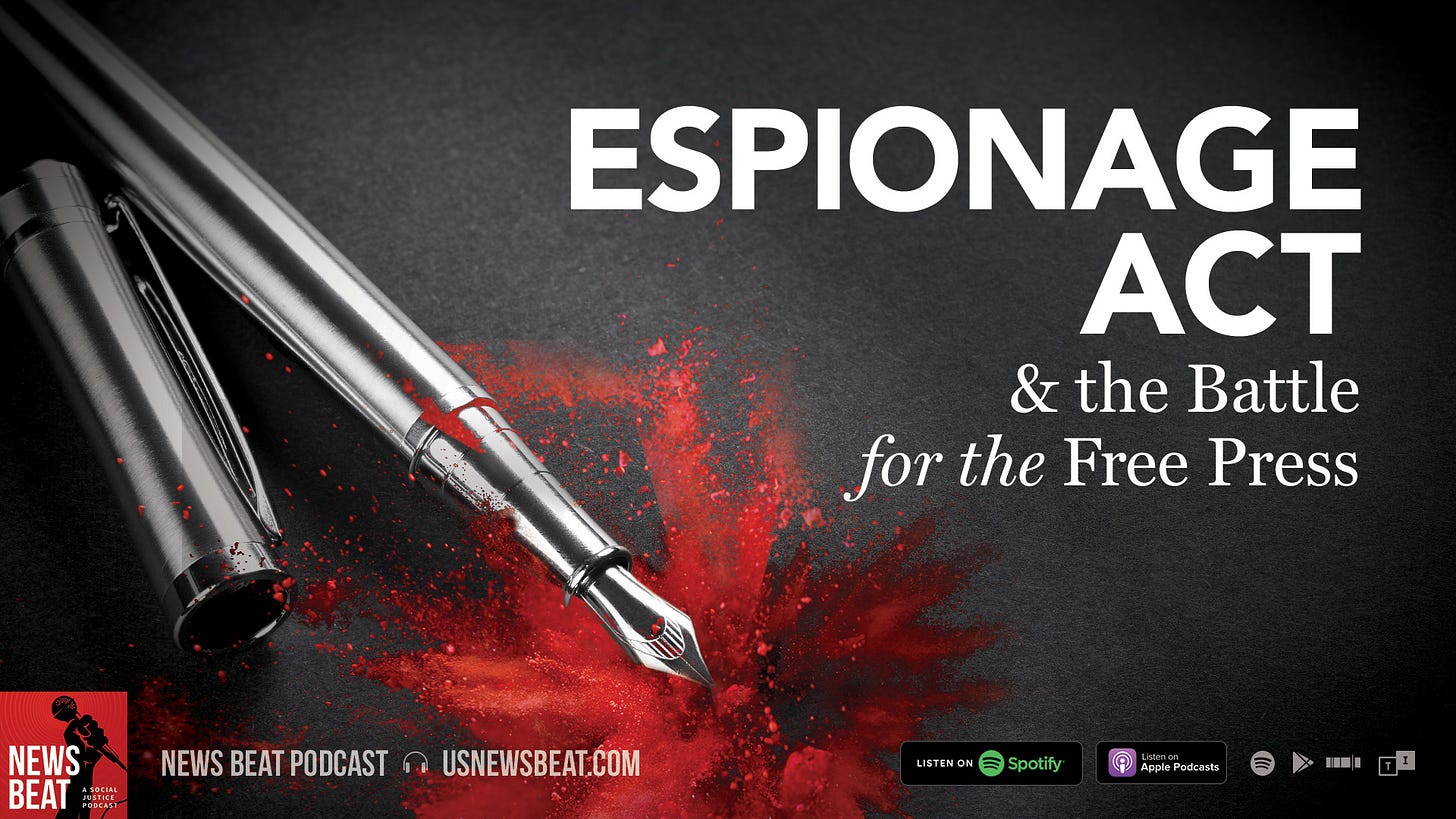Emergency Newsletter: Assange Ruling Escalates U.S. War Against the 'Free' Press
Julian Assange can be extradited to the United States, a U.K. court says in a ruling that threatens journalism, and by extension, democracy itself.
News Beat is a multi-award-winning podcast that melds hard-hitting journalism with hip-hop to inform, educate, and inspire.
Hey, everyone. We typically try to publish newsletters once a week, but the latest ruling in Julian Assange’s extradition case to the United States is so important that we couldn’t wait. Sincere thanks to everyone who engages with the newsletter and the podcast. We’re dropping a share button below so you can help spread the word about our Substack!
On Friday, Britain’s High Court approved WikiLeaks publisher Julian Assange’s extradition to the United States, potentially setting up the most significant press freedom case since the release of the Pentagon Papers in 1971.
The decision comes after a lower U.K. court in February ruled in favor of Assange, citing the jailed publisher's mental health, and three months after an explosive report in Yahoo! News detailing an alleged CIA plot to kidnap and assassinate the Australian.

The 50-year-old is charged with 17 counts under the draconian Espionage Act, a World War I-era law intended to prosecute spies (more on that in a bit). The current legal saga escalated in April 2019, when Assange was dragged out of the Ecuadorian embassy in London, where he lived for seven years until that protection was revoked.
Assange will reportedly remain in a London prison while his defense appeals the ruling.
According to The Washington Post:
“Stella Moris, Assange’s partner, mother of his two children and his former lawyer, said they will file a final appeal to the British Supreme Court, which would hear the case only if the court believes it involves a point of law ‘of general public importance.’ That process could take weeks or months.
If the British Supreme Court court declines to hear Assange’s final appeal, he could seek a stay of extradition from the European Court of Human Rights — which Britain is still subject to — a substantial legal hurdle.”
Free press groups immediately assailed the ruling.
“We condemn today’s decision, which will prove historic for all the wrong reasons,” said Reporters Without Borders Secretary-General Christophe Deloire. “We fully believe that Julian Assange has been targeted for his contributions to journalism, and we defend this case because of its dangerous implications for the future of journalism and press freedom around the world. It is time to put a stop to this more than decade-long persecution once and for all. It is time to free Assange.”

Origins of U.S.-Assange Saga
Assange’s contentious relationship with the U.S. government dates back to April 2010, when WikiLeaks published cockpit footage from U.S. Apache gunships slaughtering more than a dozen people, including two Reuters journalists. Dubbed “Collateral Murder," the 39-minute video sent shockwaves around the world, as millions watched the U.S. military murder innocent civilians.
The long-sought footage was leaked by a U.S. Army Private First-Class, named Chelsea Manning. Manning also provided WikiLeaks with thousands of military documents and diplomatic cables that separately became known as the “Iraq War Logs” and “Afghan War Diary.” Among the more haunting revelations: evidence that U.S. troops executed at least 10 Iraqi civilians and ordered an airstrike to cover it up.
Manning herself was charged under the Espionage Act and sentenced to 35 years in prison following her court martial at Ft. Meade in Maryland—home base of the National Security Agency (NSA). She served seven years after President Obama commuted her sentence prior to his leaving office. Manning’s prosecution was part of an unprecedented crackdown on whistleblowers by the Obama administration—one that press freedom groups warned would set a dangerous precedent.
Assange’s indictment came under the Trump administration, which charged him with 17 counts under the aforementioned Espionage Act and one under the Computer Fraud and Abuse Act. Taken together, Assange faces the prospects of up to 175 years in prison. The government essentially sent a message that investigative journalism can be criminalized—meaning a prosecution of Assange would jeopardize every single journalist alive.
Biden Picks Up Where Obama & Trump Left Off
Biden joins his two most recent predecessors, along with George W. Bush, in escalating a troubling war against the free press, one that Obama fought with vigor.
Obama’s Department of Justice went further than just charging whistleblowers for leaks—if that weren’t troubling enough. James Risen, among the most notable investigative reporters of his generation, was nearly compelled to testify in a leak case about a chapter in his book documenting a botched attempt to sabotage Iran’s nuclear program; Associated Press reporters had their phone records seized; and a Fox News journalist was named a co-conspirator in another leak investigation.
Despite all this, Obama’s Justice Department decided against indicting Assange, apparently out of concern that it could criminalize journalism.
Biden, however, is pursuing a case that began under Trump, whom Democrats and the corporate media establishment warned for years was a danger to democracy.
But with Biden in office, the media has been largely silent on the issue of Assange—a publisher—being indicted and potentially prosecuted on U.S. soil given the case’s incredibly high stakes.
Additional Resources From News Beat Podcast
Before teaming up with pod god Manny Faces to launch News Beat, Rashed and Chris—its editors—spent years covering civil liberties and attacks on the free press. We were one of the few journalists at Chelsea Manning’s court martial, and shocked by the absence of most mainstream news outlets—including many that continued to rely on Manning’s leaked documents to contextualize news stories related to the so-called “war on terror.”
One of our first podcast episodes documented Chelsea Manning’s case, with the help of John Kiriakou, himself a CIA whistleblower imprisoned for leaks. It also featured Trevor Timm of the Freedom of the Press Foundation and Kevin Gosztola, a journalist who routinely covers such issues. Since Manning’s leaks continue to be criminalized—now with Assange’s indictment and potential extradition—we thought it was important to revisit that powerful episode.
Here are links for our podcast “Chelsea Manning: Collateral Murder Cover-Up”:
Your Favorite Podcast App (Scroll through our feed to find the episode!)
The Espionage Act should be on the top of anyone’s mind if you’re concerned about government overreach and the erosion of civil liberties. The law is so powerful that it doesn’t allow anyone charged under it to argue “public interest,” severely limiting their defense. (It’s one of the explanations frequently given by NSA whistleblower Edward Snowden for leaving the United States.) Initially intended for spies, the law was rarely used against journalists after its passage. However, it was deployed against outspoken critics of the first World War, including socialist icon Eugene Debs. It famously evolved into a tool against the press following Daniel Ellsberg’s leaking of the Pentagon Papers—a secret history of the Vietnam war that proved successive presidential administrations lied to the public about the war. To help us explain the history of the Espionage Act and its impact on the the press and Assange, we enlisted the legendary First Amendment attorney James Goodale, who represented The New York Times in four U.S. Supreme Court cases, including the one involving the Pentagon Papers.
Here are links for our podcast episode “Espionage Act & the Battle for the Free Press”:
Another great resources comes via our podcast friends at UNFTR. Its host, Max, meticulously details important events involving Assange and what his potential prosecution means for the media and democracy. Click this link to find UNFTR and scroll through for the Assange episode.
Join the News Beat Podcast Family!
Subscribe to our Substack to ensure you receive information about episodes, relevant stories, and more.
You can listen to News Beat on your favorite podcast app. The button below will enable you to subscribe wherever you listen to pods.
Please share our Substack to help build this community and support independent media.
News Beat is a multi-award-winning podcast brought to you by Morey Creative Studios and Manny Faces Media.
Audio Editor/Sound Designer/Producer/Host: Manny Faces
Editor-In-Chief/Producer: Christopher Twarowski
Managing Editor/Producer: Rashed Mian
Episode Art: Jeff Main
Executive Producer: Jed Morey






